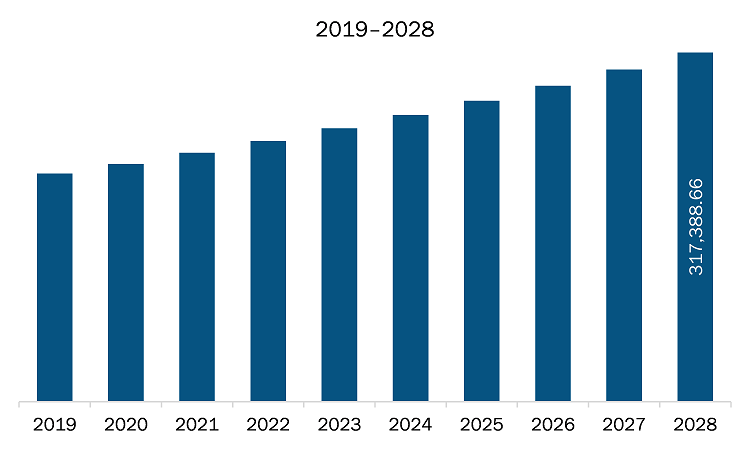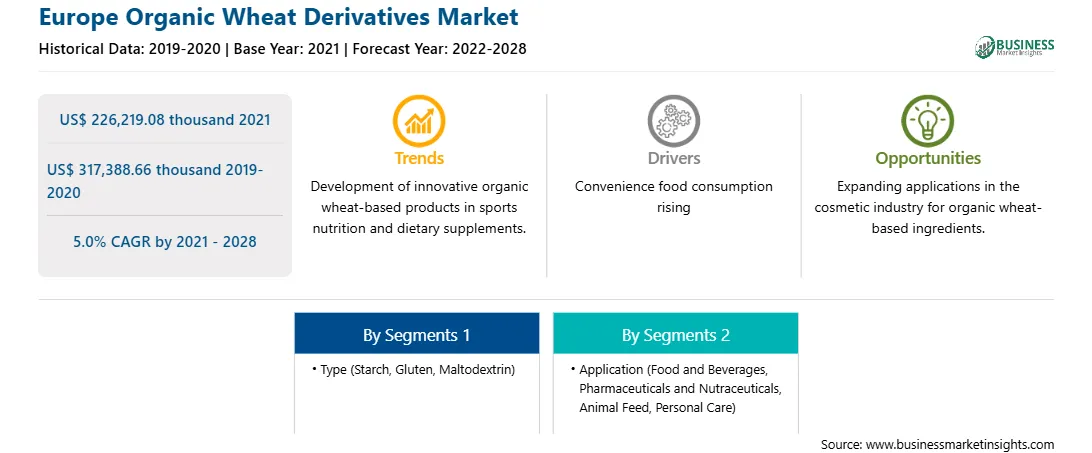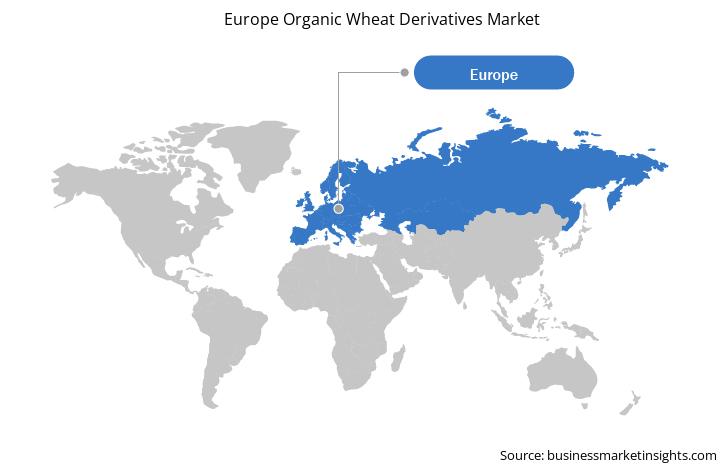The European continent comprises several developed and developing economies such as Germany, France, Italy, UK, and Russia, among others. Transforming lifestyle trends concerning the food & beverage and consumer goods industry has had a noteworthy influence on the organic wheat derivatives market in Europe. The popularity of organic wheat derivatives has increased within the region, particularly in Germany, France, and the UK. This is due to the benefits associated with this ingredient and their high level of nutrients activity. Despite modern cooking devices, there is a rise in the number of depending on ready-to-cook (RTC) and ready-to-eat (RTE) food as it is less time-consuming. The dual-income consumers mainly prefer these types of products owing to the lack of time available for cooking at their disposal. People living mostly in a city or working throughout the day have shown appreciation for RTC & RTE food products, as they are easy and quick to consume. More and more consumers in the EU are consuming products which are made up of natural substances and processes.
In Europe, currently the France and Russia are the hardest-hit countries by the coronavirus pandemic. It is estimated to suffer an economic hit due to a lack of revenue from various industries, as the country recorded the highest number of coronavirus cases followed by the UK, Italy, Germany and Spain. Other member states have implemented drastic measures and travel restrictions, including partially closing their borders. This is anticipated to impact market growth in Europe. The ongoing pandemic has drastically altered the status of the organic wheat derivatives industry and has negatively impacted the growth of the market. The COVID-19 outbreak has distorted operational efficiency and disrupted the value chains due to the sudden closure of national and international boundaries, creating revenue loss and damage. The disruptive value chain has had a negative impact on raw material supply, which, in turn, is impacting the growth of the organic wheat derivatives market. However, as the economies are planning to revive their operations, the demand for organic wheat derivatives is expected to rise worldwide.

Strategic insights for the Europe Organic Wheat Derivatives provides data-driven analysis of the industry landscape, including current trends, key players, and regional nuances. These insights offer actionable recommendations, enabling readers to differentiate themselves from competitors by identifying untapped segments or developing unique value propositions. Leveraging data analytics, these insights help industry players anticipate the market shifts, whether investors, manufacturers, or other stakeholders. A future-oriented perspective is essential, helping stakeholders anticipate market shifts and position themselves for long-term success in this dynamic region. Ultimately, effective strategic insights empower readers to make informed decisions that drive profitability and achieve their business objectives within the market.

| Report Attribute | Details |
|---|---|
| Market size in 2021 | US$ 226,219.08 thousand |
| Market Size by 2028 | US$ 317,388.66 thousand |
| Global CAGR (2021 - 2028) | 5.0% |
| Historical Data | 2019-2020 |
| Forecast period | 2022-2028 |
| Segments Covered |
By Type
|
| Regions and Countries Covered | Europe
|
| Market leaders and key company profiles |
The geographic scope of the Europe Organic Wheat Derivatives refers to the specific areas in which a business operates and competes. Understanding local distinctions, such as diverse consumer preferences (e.g., demand for specific plug types or battery backup durations), varying economic conditions, and regulatory environments, is crucial for tailoring strategies to specific markets. Businesses can expand their reach by identifying underserved areas or adapting their offerings to meet local demands. A clear market focus allows for more effective resource allocation, targeted marketing campaigns, and better positioning against local competitors, ultimately driving growth in those targeted areas.

The organic wheat derivatives market in Europe is expected to grow US$ 317,388.66 thousand by 2028 from US$ 226,219.08 thousand in 2021. The market is estimated to grow at a CAGR of 5.0% from 2021 to 2028. A significant transformation has been witnessed with change in consumer perception and rise in health concerns globally. Growing awareness about the side-effects associated with animal-based food products and rising adoption of veganism are two important factors escalating the demand for plant-based products among consumers. This has positively impacted the demand for organic wheat derivatives in developed and developing economies. Nowadays, manufacturers are focusing on prevailing market trends and end use requirements to offer products as per their demands. As the consumers have directed their focus toward plant-based products, the demand for organic wheat derivatives is expected to rise and provide strong growth opportunities to manufacturers operating in the same line of business. This includes organic wheat derivatives in the form of organic wheat starch, organic wheat gluten, organic wheat bran, and maltodextrin, among others, which are extensively in demand across the globe. Hence, several companies have come up with organic wheat derivatives, which could be effectively used in diverse application bases. For instance, KRÖNER-STÄRKE has become one of the leading European producer of organic wheat starch. Also, Cargill Incorporated is involved in producing and offering organic vital wheat gluten under its brand, GluVital. To gain competitive edge and establish strong position in the market, manufacturers of organic wheat derivatives are adopting various strategies such as product development, expansion, and innovation to compete in the market and fulfill the demand of consumers. Hence, the increase in demand for plant-based products, along with new product developments, is strongly complementing the growth of organic wheat derivatives market.
Europe organic wheat derivatives market is segmented based on type and application. The Europe organic wheat derivatives market based on type is segmented into starch, gluten, maltodextrin, and others. Starch segment accounted for the highest share in the market in 2020 and maltodextrin is expected to be fastest growing during forecast period. Based on application, is segmented into food and beverages, pharmaceuticals and nutraceuticals, animal feed, personal care, and others. The food and beverages segment accounted for the highest share in 2020 and animal feed is expected to be the fastest growing during forecast period.
A few major primary and secondary sources referred to for preparing this report on organic wheat derivatives market in Europe are company websites, annual reports, financial reports, national government documents, and statistical database, among others. Major companies listed in the report are Sacchetto Spa, Cargill, Incorporated, ETEA S.R.L., Archer Daniels Midland Company, AGRANA Beteiligungs-AG, Kröner-Starke Bio, Amylon, Manildra Group, Ulrick & Short Limited, and Tate & Lyle PLC among others.
The Europe Organic Wheat Derivatives Market is valued at US$ 226,219.08 thousand in 2021, it is projected to reach US$ 317,388.66 thousand by 2028.
As per our report Europe Organic Wheat Derivatives Market, the market size is valued at US$ 226,219.08 thousand in 2021, projecting it to reach US$ 317,388.66 thousand by 2028. This translates to a CAGR of approximately 5.0% during the forecast period.
The Europe Organic Wheat Derivatives Market report typically cover these key segments-
The historic period, base year, and forecast period can vary slightly depending on the specific market research report. However, for the Europe Organic Wheat Derivatives Market report:
The Europe Organic Wheat Derivatives Market is populated by several key players, each contributing to its growth and innovation. Some of the major players include:
The Europe Organic Wheat Derivatives Market report is valuable for diverse stakeholders, including:
Essentially, anyone involved in or considering involvement in the Europe Organic Wheat Derivatives Market value chain can benefit from the information contained in a comprehensive market report.